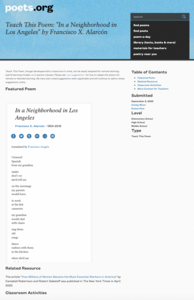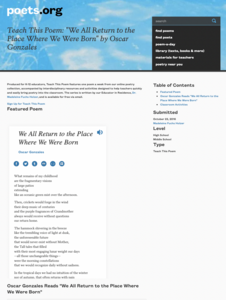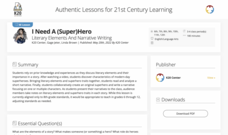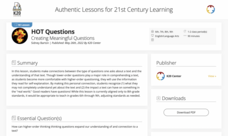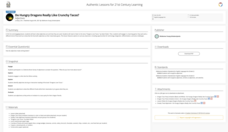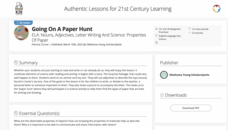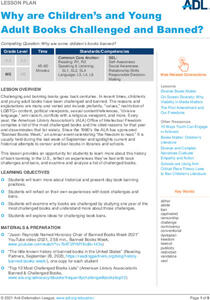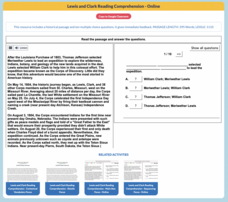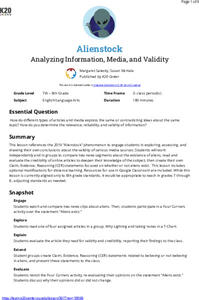Academy of American Poets
Teach This Poem: "In a Neighborhood in Los Angeles" by Francisco X. Alarcón
After sketching an essential person and reading an article, scholars read the poem "In a Neighborhood in Los Angeles" by Francisco X. Alarcón. They listen to the poem in English and Spanish and record lines that stand out to them. Small...
Academy of American Poets
Teach This Poem: "We All Return to the Place Where We Were Born" by Oscar Gonzales
What do you remember about your childhood home? Scholars listen to Oscar Gonzales reading his poem "We All Return to the Place Where We Were Born" in Spanish and English, then discuss what they learned about Gonzales.
Academy of American Poets
Teach This Poem: "The Snowfall Is So Silent" by Miguel de Unamuno
Cold, beautiful, unique! Class members closely examine John Singer Sargent's watercolor "Snow," taking note of the artist's techniques, and pair up to discuss how the image makes them feel about snow. They then repeat the process with...
Academy of American Poets
Teach This Poem: "November 2: Día De Los Muertos" By Alberto Ríos
Scholars examine a colorful and detailed picture, then view an engaging video in preparation for reading the poem "November 2: Día De Los Muertos" by Alberto Ríos. Learners discuss their observations, feelings conveyed, and the...
Academy of American Poets
Teach This Poem: "The Teller of Tales" by Gabriela Mistral
The poem "The Teller of Tales" by Gabriela Mistral is the subject of a thoughtful lesson that allows scholars to listen to or read the poem, then discuss its meaning.
K20 LEARN
Conflict And Choice In Tangerine: Character Development
Introduce middle schoolers to Edward Bloor's novel Tangerine with a instructional activity that asks scholars to make predictions about events in the novel based on an article written by the Smoop Editorial team. Predictions are posted...
K20 LEARN
Let's Mail Away!: Writing Letters
Scholars watch a video or listen to a story about writing letters, then discuss their importance. A scavenger hunt challenges them to identify common elements of friendly letters and create an anchor chart. Pupils write letters to a...
K20 LEARN
I Need A (Super)Hero: Literary Elements And Narrative Writing
Need a hero? Super! Groups create their modern-day marvel and craft a narrative with all the elements required in such a tale.
K20 LEARN
HOT Questions: Creating Meaningful Questions
Scholars examine a list of questions and sort them into corresponding groups based on similarities. A gallery walk allows peers to see how their peers sorted questions and leave notes. Costa's Level of Questions is the topic of a...
K20 LEARN
Do Hungry Dragons Really Like Crunchy Tacos?: Adjectives
Tacos are the theme of a lesson all about adjectives. Scholars list as many adjectives as possible to describe tacos and play a game of Not Like the Others before reading Dragons Love Tacos by Adam Rubin. Peers guess their favorite foods...
K20 LEARN
Going on a Paper Hunt: Nouns, Adjectives, Letter Writing and Science - Properties of Paper
A lesson introduces scholars to nouns and adjectives. After listening to a short story and practicing creating adjectives with a card sort, pupils go on a paper hunt to locate different types of paper, complete a chart with adjectives,...
Anti-Defamation League
On-Screen Diversity: Why Visibility in Media Matters
Characters play a significant role in why we like certain shows and movies but are the characters we watch representing the diverse society in which we live? Scholars examine this question through thoughtful discussion about popular...
K20 LEARN
Growing Themes
The theme of a work is not a single word! Rather it is a statement that reflects what a writer believes or wants readers to understand about a topic or subject. Here's a short, but powerful lesson that utilizes passages from The...
K20 LEARN
Diggin' Deeper - Poetry Made Relevant: Poetry And Poetic Devices
What do Beethoven, Bob Dylan, and Pharrell all have in common? Works by these three musicians are used to launch a study of poetry. Class members listen to passages from the music and craft a quick write about how the music makes them...
K20 LEARN
Brushstrokes: Communication/Using Descriptive Language
Sometimes a picture reflects a thousand descriptive words. To illustrate the importance of sensory words in descriptive writing, scholars listen to a song and craft a painting in response. After sharing their work with the class,...
Overcoming Obstacles
Giving Presentations
With their action plans in place, groups now develop a presentation to get others interested in their project. Scholars learn how to present themselves during a presentation and elaborate on and add visuals to their presentation. After...
Overcoming Obstacles
Presenting Yourself
"Presenting Yourself," the last lesson in the "Looking to the Future" module, asks participants to review and reflect on what they have learned about themselves in the Overcoming Obstacles course. They review their course folder and...
K20 LEARN
Bear Tale: Author's Purpose - Informing Or Entertaining
After reading The Mitten by Jan Brett, scholars discuss the author's purpose. Small groups compare and contrast a book written to entertain and a book to inform, then create a T-Chart detailing the characteristics of each. Learners...
Anti-Defamation League
Why are Children’s and Young Adult Books Challenged and Banned?
September's "Banned Books Week" brings attention to the number of books that are challenged, censored, or banned each year. After watching a video about banned book week, reading articles about the history of book banning, and examining...
Mr. Nussbaum
Lewis and Clark
An informational text focuses on Lewis and Clark. Scholars read the text and answer 10 questions to test their reading comprehension skills.
K20 LEARN
A Way With Words: Copy Editing And The Writing Process
Learning to edit copy using correct grammar and mechanics is an essential skill in school—where scholars are called upon to edit their peers' writing—and in business. Class members practice this skill by first editing a provided article...
Penguin Books
Teacher's Guide: A Raisin in the Sun by Lorraine Hansberry
It's the American Dream! A house of your own, a better life, freedom to be who you want. But what happens when the dream withers? Lorraine Hansberry's award-winning drama, A Raisin in the Sun, offers some powerful answers to these...
K20 LEARN
Active Or Passive?—"The Monkey's Paw": Grammar/Language Usage
Don't you wish you could use passive voice? Be careful what you wish for! "The Monkey's Paw" is the focus of a grammar and language usage lesson about active and passive voice. Readers identify examples of active and passive voice in...
K20 LEARN
Alienstock: Analyzing Information, Media, And Validity
One only has to watch MSMBC and FOX News to realize that media can present the same story in very different ways. Middle schoolers have an opportunity to test their ability to determine the validity and trustworthiness of information by...


